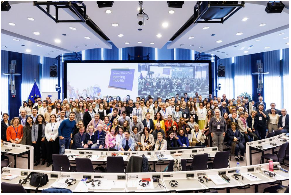The initiative to promote educational mobility for everyone in the European Education Area
Have Your Say!
During March-April 2023, as part of the initiative to promote educational mobility for everyone in the European Education Area, the European Commission held a public consultations with the participation of representatives of 27 EU member states. This initiative became a new stage of public involvement in policy-making based on the European Citizens’ Learning Mobility Panel.
During three debate sessions, 150 randomly selected participants debated about the improvement of mobility processes, existing barriers and challenges, ways to overcome them during mobility in education for students and educators as well as further prospects for the implementation of Erasmus+ mobility.
The participants pointed out key areas for improvements and prioritised solutions to increase access and participation to learning experiences abroad, regardless of age and educational field, from school education to vocational education and training, as well as higher education, adult learning, and also non-formal learning settings.
With the general goal of making the learning environment more accessible for everyone, the panel’s recommendations highlight the importance of increasing further the awareness of opportunities and encourage the participation of people with fewer opportunities. They also outline opportunities and challenges brought by digitalisation and explore sustainable solutions to reduce the environmental impact of mobility.
The ideas put forward by the citizens turned into 21 concrete recommendations aiming to facilitate the mobility of learners, educators and staff from one country to another, in particular:
- Recommendation 1 A vehicular language (lingua franca) as a tool for learning mobility
- Recommendation 2 Living multilingually in Europe
- Recommendation 3 Expansion of existing learning mobility programs for people of all ages and socioeconomic layers
- Recommendation 4 Promoting deeper integration of the vocational training sector across the EU
- Recommendation 5 Enabling learning mobility for families
- Recommendation 6 EU programme to promote hybrid models of learning mobility for employees
- Recommendation 7 Improving language learning through new technologies
- Recommendation 8 Advertise and promote language programmes
- Recommendation 9 Deployment and adaptation of Erasmus PLUS information centres and services
- Recommendation 10 Assuring tailored financial support for all people going on learning mobility
- Recommendation 11 Ambassadors for a more mobile Europe
- Recommendation 12 Mentors for a better welcome in the destination country
- Recommendation 13 For greener learning mobility!
- Recommendation 14 Recognise the role of educators in learning mobility!
- Recommendation 15 Financial support for the professional development of employees
- Recommendation 16 Information on worker mobility in Europe
- Recommendation 17 Targeted information campaigns on learning mobility
- Recommendation 18 Measures and activities to promote non-discrimination in learning mobility
- Recommendation 19 Overcoming prejudices by encouraging a more balanced distribution of Erasmus+ placements
- Recommendation 20 Assessing the administrative barriers faced by employees and employers and how to overcome them
- Recommendation 21 Promotion of a targeted communication strategy for Erasmus+
You can learn more about the recommendations developed by the debate participants here.
Information about the debates, interim and final documents on the outcomes Інформація про дебати, проміжні робand developed recommendations is available here.

